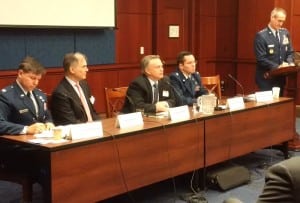
Efforts to achieve low-cost, fast access to space for the U.S. military stand to benefit from an increasingly favorable financial, political and technological climate, Air Force and industry experts said May 8.The current willingness of billionaires, such as Blue Origin’s Jeff Bezos and SpaceX’s Elon Musk, to invest their own money on space would have been hard to imagine 20 years ago. And their recent success in developing reusable rockets has fueled confidence in the technology. For instance, SpaceX launched…

 By
By 











